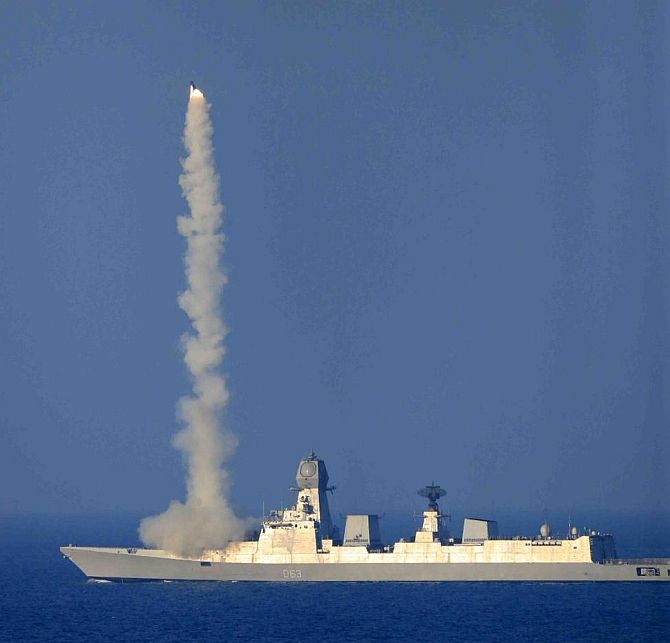'China's South China Sea build-up and 'territorial sea' construct potentially affects 55 percent of Indian trade passing through the region. Hence, coordinating with the US and Japan could provide dividends to India in the longer run,' says Srikanth Kondapalli.

From October 12 to 19, a high-level trilateral exercise between the naval forces of India, the United States and Japan will be held in the Bay of Bengal as a part of the extended Malabar Exercises.
Conducted since 1992 between India and the United States, Japan was invited to participate in these exercises in this region. Bilaterally, both the US and India have conducted exercises with Japan earlier.
India and Japan conducted the first naval exercise in June 2012. All three navies, in addition to Singapore and Australia, joined the multilateral exercises of September 2007, but discontinued after China had issued a demarche.
The exercise acquires political significance and legitimacy as it is a follow-up to the first foreign ministerial meeting at New York on September 29 between these three countries. All three nations had seven meetings by June 2015 at the joint secretary level since 2011, but decided to elevate the coordination.
Several new developments in the recent past have triggered interest in this trilateral exercise. One of the primary concerns is the challenge to the free flow of goods and services on the high seas in the recent times and strengthening the Indo-Pacific idea.
Specifically, sustained efforts to counter piracy incidents in the Indian Ocean paid off, but these incidents re-surfaced in the South China Sea. In 2014, for instance, according to the International Maritime Organisation statistics, nearly half the global piracy incidents erupted in the South China Sea, calling for attention of the stake-holders in the region.
Secondly, China's naval activities are raising concerns. Although nearly half of China's GDP is on the high seas in terms of maritime trade and energy imports and hence has genuine concerns on maritime stability issues, its role in the recent past was criticised by many.
While no country other than China had expressed reservations about the trilateral exercise, China's naval activities have come under sharp criticism from neighbours and others -- provoking Japan to pass 'collective self-defence' legislation recently.
Beijing had proposed revival of the 'maritime Silk Road' in October 2013, promising huge funds in civil-military dual-use maritime infrastructure projects across Asia, Africa and Europe.
China sent 21 Gulf of Aden naval missions since 2008 with some raising concerns such as its earlier amphibious and recent air defence missions. China also pursues balance of power through the conduct of naval exercises with Pakistan its 'all-weather' friend, besides undertaking extensive construction and port calls in the region. Both conduct naval exercises since October 2003, with the first one pitching 1,600 sailors.

More shocking for New Delhi was the Chinese submarine docking at Colombo and Karachi, in addition to China's supply of frigates, missiles and other naval equipment to Pakistan and other South Asian countries.
China also has been making dramatic gestures in the South China Sea where it is building islands through reclamation -- providing sea and long-range aviation capability to target the Andaman and Nicobar Joint Command.
China's South China Sea build-up and 'territorial sea' construct potentially affects 55 percent of Indian trade passing through the region. Hence coordinating with the US and Japan could provide dividends to India in the longer run.
Thirdly, despite some dissonance expressed by Chinese, the trilateral naval exercise may not attract much attention in Beijing as China itself has been mending fences with the United States. During President Xi Jinping's recent visit to Washington, both agreed to pursue maritime confidence building measures to overcome 'incidents at sea and air.'
Last year, China also for the first time sent naval ships to the US and Japan-led RIMPAC exercises at Hawaii indicating its intention to abandon the previous 'touch-me-not' policy towards the US.
The three navies intend to pitch aircraft carriers, latest destroyers, frigates and aircraft in the trilateral exercise for enhancing inter-operability between the forces. Tactical principles in overcoming certain scenarios will be practiced in these exercises indicating to their 'high-end' practices.
Besides the motive of keeping the seas open, humanitarian assistance, disaster relief and the like will be tested. India's efforts in such missions after a tsunami hit Southeast Asia and South Asia a decade ago are still cited.
The idea of sustaining trilateral cooperation between the navies of India, the US and Japan had been raised, although the clamour of Australia and some Southeast Asian countries to join such exercises suggest to its growing demand. Only last month, India and Australia conducted a submarine exercise. Besides, the condition for the broad-based exercise is felt across the region for securing maritime domains.
Dr Srikanth Kondapalli is Professor in Chinese Studies at the Jawaharlal Nehru University.










